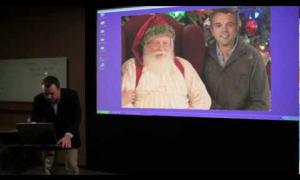Speechwriting in an Association
July 31, 2008
Speechwriting in an association setting is as different from speechwriting for a corporation as …
You can complete the simile when I’m done.
But, after a decade or so of corporate speechwriting, I jumped at the opportunity to write for the Ameri-can Medical Association. Health care was and is in turmoil. Medical science is accelerating at an accelerating rate. Human genome. Nanotechnology. Advances in scanning technologies.
I viewed the challenge as that of speechwriting in IBM in the heyday of computer technology. But, I suddenly found a fundamental difference my peers in other associations with business backgrounds found.
You have to earn your stripes every time out.
For one thing, there is the matter of the audience.
With corporate audiences, the president or chief executive officer is a known quantity with most au-diences. You write for a person well-acquainted with the audiences and well-acquainted with the ins and outs of the business, the industry and the national economy.
With association audiences, the speaker changes with each annual association meeting. Most are brand new to major venue speaking. All have enormous knowledge bases in their specialty and their corner of the world. Few have a national perspective on anything.
The challenge is the same an Associated Press sportswriter described to me years ago when we both were manning the wires one slow news night. He said, “Jack Nicklaus was not the baseball player Mickey Mantle was. And Mickey couldn’t hit a 9 iron worth a damn.”
Beyond the audience is the message.
There are more than 23,000 associations and societies in America but only 100 Fortune 100 companies, for beginners. And, within each of those associations, there are multiple agendas, multiple priorities, multiple conflicting personalities. The herd of cats rarely has a common purpose. In a corporation, the boss may not always be right, but the boss is always the boss. The rest fall in line.
The rules of rhetoric laid down by Aristotle a few years back provide ample guidance in building solid arguments to persuade any audience. But they are especially useful in speeches for association au-diences.
Unlike a corporation, where the boss rules, in an association everyone is a free-floating atom of self-interest who must be persuaded with solid evidence and hard-edged logic.
The audience is volunteers, not mercenaries, and the story has to be water-tight.
Venues selection is different, too. When trying to schedule an executive speaker for your corporate em-ployer, you will run into skepticism. You obviously are offering someone with a point of view, a marketing agenda, a share price improvement agenda.
When trying to schedule an association executive, you more often than not will find a willing program manager or program committee, an-xious to hear the national or international viewpoint of someone “above crass motives.”
Of course, the association has motives, has key messages, has a point of view. But the host knows that and suspends skeptical judgment in hopes of hearing something intriguing and informative from your speak-er.
Finally, and reluctantly, I mentioned the pace of change.
“Oh, Bill,” you say, “change is a way of life in our business, our industry, our culture.”
And you will be right.
But, no matter the pace of change, it stays in your business, your industry, your culture.
With medicine, in particular (I can’t speak for other associations), we’re playing quidditch with an infinite number of snitches, to coin a phrase.
The object of the game of quidditch is to catch one snitch, garner 150 points and win the game. The object of association speechwriting is to catch today’s news, today’s Congressional hearing, today’s research breakthrough, today’s scientific study reported in the Journal of the American Medical Association, and weave it into a narrative that makes sense.
Any association and many corporations find themselves awash in change that is accelerating in pace and an information base growing exponentially by the day.
That much is common to both kinds of speechwriting—corporate- and association-based.
That, too, makes speechwriting the most exciting specialty a writer can pursue.
Maybe we should for an association.
So, back to the lead:
Speechwriting in an association setting is as different from speechwriting for a corporation as … can be.
William Shaffer is the former director of Leadership Communications, American Medical Association. He may be reached at [email protected].


